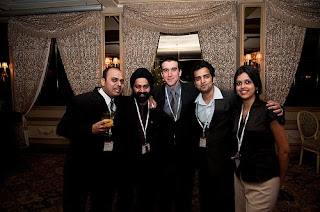From left to right: Abhijeet, Karanjit, Eric, Vishal & Ramya
During the busy integrated core, the MBA class of 2011 received an email from the MBA office informing us about a case competition being held by John Molson business school. Students were invited to form teams and register for the event. The competition was clashing with MBA games, which were being held in Québec city during the same weekend. Approximately 40 students were taking part in MBA games, so it was difficult to organize a full team. Finally a team was formed consisting of Vishal Patkar, Ramya Iyer, Abhijeet Jagtap, Eric Demers and of course, me. Eric agreed to be our coach as all the teams were required to have a coach.
The competition format is a round-robin tournament consisting of five business cases. With three hours to prepare for each case, teams of four students evaluate and analyze an unpublished case using the knowledge and skills gained during their work experience and the MBA program. The competition is unique, as it does not allow students to use standard tools like PowerPoint and the Internet. The final presentation is a hand written presentation that is presented to a panel of senior executives.
One of the most interesting cases we did was a live case for Montreal Canadian, an Ice hockey club. Senior executives from the company, including the VP of marketing and the owner of the team Mr. Jeff Molson, gave a presentation on the background of the company and the problem they were facing. It was a marketing case and was a very good experience for all of us.
Overall our performance was not spectacular but the learning from the experience was indeed spectacular. We also got an opportunity to make new friends from various universities and expanded our network. This was the first time a team from UBC participated in the competition. We feel we can contribute a lot to the team that goes to the competition next year.
-
Most of the schools that participate in the competition have a dedicated coach with whom they practice for two to three months. The same coach usually carries over from one year to another, and thus providing effective mentoring to the team. In fact we saw coaches who have been coming to the competition for 10 years in a row.
-
Apart from the analysis, skills in drawing and writing on transparencies are critical. Given the fact that teams cannot use a laptop, transparencies are the only way to convey the ideas to the judges.
-
Effective time management is critical. Teams only have three hours to analyze the case and build the transparencies. It is critical that teams practice preparing transparencies, since it can potentially take a lot of time.
Karanjit Singh Kochar is full time student with Sauder, specializing in Finance. He is the current president for the MBA Finance club and has over four years of experience working as an entrepreneur in New Delhi, India.

